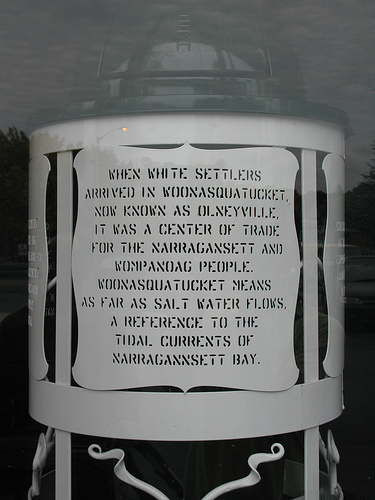 |
The Olneyville Housing Corporation (Providence, Rhode Island) had accepted the idea of having verbal accounts of the history of Olneyville, laser-cut into steel, decorate the metal trash cans commissioned as part of a neighborhood improvement project. This is precisely what artist Lu Heintz did. However, her view of Olneyville’s history was critical of processes of gentrification and the “tone” of her writing did not suit OHC. They rejected the cans. The incendiary statements are not what they ordered, they said.
The cans succeed in giving voice to an alternative history of Olneyville – one that merits additional protection as it reflects the views of those who have few avenues for expression. It would be hard to imagine a more appropriate goal for a public project. It is thus all the more disturbing that precisely this work, which deals directly with important public issues, was deemed inappropriate for public display.
This action raises serious First Amendment concerns: as a public body, OHC cannot impose its point of view on the whole community and suppress ideas it does not like. The U.S. Supreme Court has affirmed: "If there is a bedrock principle of the First Amendment, it is that the government may not prohibit the expression of an idea simply because society finds the idea itself offensive or disagreeable." (Texas v. Johnson, 491 U.S. 397, 414, 1989)
The Steel Yard, an artists space, which had been commissioned to produce the cans, however, agreed to withdraw Lu Heintz’ work from the Olneyville community improvement project and did not raise and First Amendment objections. Fortunately, they found an alternative public place for the cans. We are pleased that the cans will take their proper public place in the community for which they were made but remain concerned that a public body should try to stifle art, which dares to raise comunity concerns.
Here is the full text cut into the cans:
Colonization: Settlement of an area by force or conquest, often resulting in the physical displacement and cultural destruction of groups of people native to the area.
Colonización: Ocupación de un territorio para explotarlo y dominarlo administrativa, militar o económicamente.
When white settlers arrived in Woonasquatucket (now known as Olneyville), it was a center of trade for the Narragansett and Wompanoag people native to this area. Woonasquatucket means as far as salt water flows, a reference to the tidal currents of Narragansett Bay.
Cuando los colonos blancos llegaron a Woonasquatucket (actualmente llamado Olneyville), era un centro de intercambio para los Narragansett y los Wompanoag, la gente indígena de la area. Woonasquatucket significa “hasta el agua salada sube,” una referencia a los corrientes de sal de la Bahia de Narragansett.
*
Exploitation: The act of using another person’s labor without offering them an adequate compensation.
Explotación: Utilización de una persona en beneficio propio de forma abusiva, especialmente haciendola trabajar mucho y pagándole poco.
At the turn of the 20th century, eight thousand people, mostly Irish immigrants, were employed by the five mills in Olneyville. For years, the neighborhood had a reputation for labor radicalism. Striking workers won improved conditions and the highest manufacturing wages in the area.
Al principio del siglo 20, ocho mil personas, incluyendo muchos inmigrantes irlandeses, eran empleados por los cinco molinas en Olneyville. Por años, el barrio tenía una reputación por el radicalismo obrero. Huelgistas ganaron condiciones mejoradas y los sueldos manufactureros más altas de la región.
*
Disintegration: The process of separating into parts or fragments, breaking up, disuniting.
Disintegración: El proceso de dividir una cosa en fragmentos o en todas las partes que los componen; dismembrar; disociar; dividir.
In the winter of 1949, five hundred families were displaced by new highway construction, which physically separated Olneyville from Providence, while creating easier access to the suburbs for more affluent families. In the years following, mill shutdowns left thousands jobless.
En el invierno de 1949, quinientas familias estaban desplazadas por la construcción de la carretera nueva, que dividió físicamente Olneyville de Providence, y creó acceso más facil a las suburbias para familias más ricas. En los años siguientes, el cierre de las molinas dejó a miles sin trabajo.
Gentrification: A process of converting an urban area so that it conforms to middle-class tastes and interests. As an area is gentrified, increasing property taxes and rents force working-class families and small business owners to leave their neighborhood.
Aburguesamiento: Un proceso de convertir una zona urbana para que conforme a los gustos y intereses de la clase media. Cuando una zona está aburguesamado, los impuestos de propiedad y rentas suben y obligan a las familias de la clase obrera y los dueños de negocios pequeños a salir de su barrio.
In the beginning of the 21st century, with the financial and political support of the City of Providence, private developers purchased much of the industrial property in Olneyville, creating luxury living in the city’s poorest neighborhood. How will we right this wrong?
Al principio del siglo 21, con el apoyo financial y político de la Ciudad de Providence, promotores privados compró mucho de la propriedad industrial de Olneyville, providiendo viviendas lujosas en el barrio más pobre de la ciudad. ¿Como enderezamos esta injusticia?

